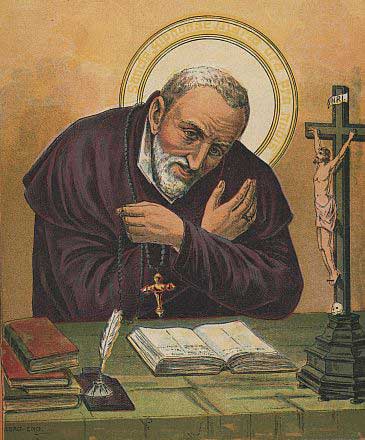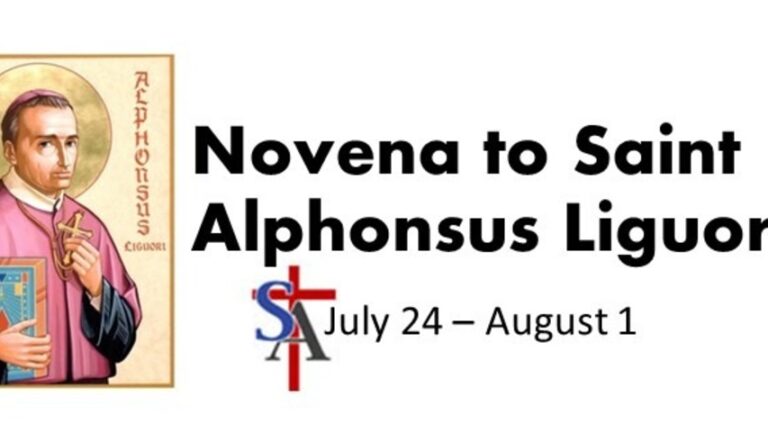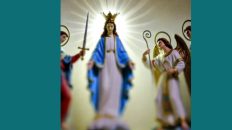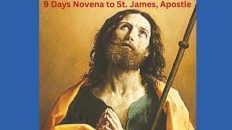On August 1, the Church celebrates the Memorial of Saint Alphonsus Liguori. St. Alphonsus is the founder of the Religious Congregation of the Most Holy Redeemer (Redemptorists); he is the patron saint of confessors, moral theologians, and those who suffer from arthritis—a condition that caused him great pain and left him confined to a wheelchair later in life.
In the name of the Father, and of the Son, and of the Holy Spirit. Amen
Come Holy Spirit, fill the hearts of your faithful and kindle in them the fire of your love.
Send forth your Spirit and they shall be created. And You shall renew the face of the earth.
O, God, who by the light of the Holy Spirit, did instruct the hearts of the faithful, grant that by the same Holy Spirit we may be truly wise and ever enjoy His consolations, Through Christ Our Lord, Amen.
 BRIEF THOUGHTS – DAY 3
BRIEF THOUGHTS – DAY 3“The sovereigns of the earth do not always grant audience readily; on the contrary, the King of Heaven, hidden under the eucharistic veils, is always ready to receive anyone.”
—St. Alphonsus
DAILY NOVENA PRAYER:
Glorious St Alphonsus, loving Father of the poor and sick, all your life you devoted yourself, with a heroic charity, to lighten their spiritual and bodily miseries. Full of confidence in your tender pity for the sick, since you yourself patiently borne the cross of illness, I come to you for help in my present need… (Mention your request here…) Loving father of the suffering, St Alphonsus, look with compassion upon me in my suffering. Ask God to give me good health. If it is not God’s will, then give me the strength to bear my cross patiently and to offer my sufferings with my crucified Savior and his Mother of Sorrows, for the glory of God and the salvation of souls, in reparation for my sins and those of others, for the needs of this troubled world, and the Holy Souls in purgatory. Amen.
BRIEF BIOGRAPHY – PART 3

In April 1729, the Apostle of China, Matthew Ripa, founded a missionary college in Naples, which became known colloquially as the “Chinese College”. A few months later Alphonsus left his father’s house and went to live with Ripa, without, however, becoming a member of his society. In his new abode he met a friend of his host’s, Father Thomas Falcoia, of the Congregation of the “Pii Operarii” (Pious Workers), and formed with him the great friendship of his life. There was a considerable difference in age between the two men, for Falcoia, born in 1663, was now sixty-six, and Alphonsus only thirty-three, but the old priest and the young had kindred souls. Many years before, in Rome, Falcoia had been shown a vision of a new religious family of men and women whose particular aim should be the perfect imitation of the virtues of Our Lord. He had even tried to form a branch of the Institute by uniting twelve priests in a common life at Tarentum, but the community soon broke up. In 1719, together with Father Filangieri, also one of the “Pii Operarii”, he had refounded a Conservatorium of religious women at Scala on the mountains behind Amalfi. But as he drew up a rule for them, formed from that of the Visitation nuns, he does not seem to have had any clear idea of establishing the new institute of his vision. God, however, intended the new institute to begin with these nuns of Scala. In 1724, soon after Alphonsus left the world, a postulant, Julia Crostarosa, born in Naples on 31 October, 1696, and hence almost the same age as the Saint, entered the convent of Scala. She became known in religion as Sister Maria Celeste. In 1725, while still a novice, she had a series of visions in which she saw a new order (apparently of nuns only) similar to that revealed to Falcoia many years before. Even its Rule was made known to her. She was told to write it down and show it to the director of the convent, that is to Falcoia himself. While affecting to treat the novice with severity and to take no notice of her visions, the director was surprised to find that the Rule which she had written down was a realization of what had been so long in his mind. He submitted the new Rule to a number of theologians, who approved of it, and said it might be adopted in the convent of Scala, provided the community would accept it. But when the question was put to the community, opposition began. Most were in favour of accepting, but the superior objected and appealed to Filangieri, Falcoia’s colleague in establishing the convent, and now, as General of the “Pii Operarii”, his superior. Filangieri forbade any change of rule and removed Falcoia from all communication with the convent. Matters remained thus for some years. About 1729, however, Filangieri died, and on 8 October, 1730, Falcoia was consecrated Bishop of Castellamare. He was now free, subject to the approval of the Bishop of Scala, to act with regard to the convent as he thought best. It happened that Alphonsus, ill and overworked, had gone with some companions to Scala in the early summer of 1730. Unable to be idle, he had preached to the goatherds of the mountains with such success that Nicolas Guerriero, Bishop of Scala, begged him to return and give a retreat in his cathedral.
Falcoia, hearing of this, begged his friend to give a retreat to the nuns of his Conservatorium at the same time. Alphonsus agreed to both requests and set out with his two friends, John Mazzini and Vincent Mannarini, in September, 1730. The result of the retreat to the nuns was that the young priest, who before had been prejudiced by reports in Naples against the proposed new Rule, became its firm supporter, and even obtained permission from the Bishop of Scala for the change. In 1731, the convent unanimously adopted the new Rule, together with a habit of red and blue, the traditional colours of Our Lord’s own dress. One branch of the new Institute seen by Falcoia in vision was thus established. The other was not to be long delayed. No doubt Thomas Falcoia had for some time hoped that the ardent young priest, who was so devoted to him, might, under his direction, be the founder of the new Order he had at heart. a fresh vision of Sister Maria Celeste seemed to show that such was the will of God. On 3 October, 1731, the eve of the feast of St. Francis, she saw Our Lord with St. Francis on His right hand and a priest on His left. A voice said “This is he whom I have chosen to be head of My Institute, the Prefect General of a new Congregation of men who shall work for My glory.” The priest was Alphonsus. Soon after, Falcoia made known to the latter his vocation to leave Naples and establish an order of missionaries at Scala, who should work above all for the neglected goatherds of the mountains. A year of trouble and anxiety followed.
The Superior of the Propaganda and even Falcoia’s friend, Matthew Ripa, opposed the project with all their might. But Alphonsus’s director, Father Pagano; Father Fiorillo, a great Dominican preacher; Father Manulio, Provincial of the Jesuits; and Vincent Cutica, Superior of the Vincentians, supported the young priest, and, 9 November, 1732, the “Congregation of the Most Holy Redeemer”, or as it was called for seventeen years, “of the Most Holy Saviour”, was begun in a little hospice belonging to the nuns of Scala. Though St. Alphonsus was founder and de facto head of the Institute, its general direction in the beginning, as well as the direction of Alphonsus’s conscience, was undertaken by the Bishop of Castellamare and it was not till the latter’s death, 20 April, 1743, that a general chapter was held and the Saint was formally elected Superior-General. In fact, in the beginning, the young priest in his humility would not be Superior even of the house, judging one of his companions, John Baptist Donato, better fitted for the post because he had already had some experience of community life in another institute.
The early years, following the founding of the new order, were not promising. Dissensions arose, the Saint’s former friend and chief companion, Vincent Mannarini, opposing him and Falcoia in everything. On 1 April, 1733, all the companions of Alphonsus except one lay brother, Vitus Curtius, abandoned him, and founded the Congregation of the Blessed Sacrament, which, confined to the Kingdom of Naples, was extinguished in 1860 by the Italian Revolution. The dissensions even spread to the nuns, and Sister Maria Celeste herself left Scala and founded a convent at Foggia, where she died in the odour of sanctity, 14 September, 1755. She was declared Venerable 11 August, 1901. Alphonsus, however, stood firm; soon other companions arrived, and though Scala itself was given up by the Fathers in 1738, by 1746 the new Congregation had four houses at Nocera de’ Pagani, Ciorani, Iliceto (now Deliceto), and Caposele, all in the Kingdom of Naples. In 1749, the Rule and Institute of men were approved by Pope Benedict XIV, and in 1750, the Rule and Institute of the nuns. Alphonsus was lawyer, founder, religious superior, bishop, theologian, and mystic, but he was above all a missionary, and no true biography of the Saint will neglect to give this due prominence. From 1726 to 1752, first as a member of the Neapolitan “Propaganda”, and then as a leader of his own Fathers, he traversed the provinces of Naples for the greater part of each year giving missions even in the smallest villages and saving many souls. a special feature of his method was the return of the missionaries, after an interval of some months, to the scene of their labours to consolidate their work by what was called the “renewal of a mission.”
After 1752 Alphonsus gave fewer missions. His infirmities were increasing, and he was occupied a good deal with his writings. His promotion to the episcopate in 1762 led to a renewal of his missionary activity, but in a slightly different form. The Saint had four houses, but during his lifetime it not only became impossible in the Kingdom of Naples to get any more, but even the barest toleration for those he had could scarcely be obtained. The cause of this was “regalism”, the omnipotence of kings even in matters spiritual, which was the system of government in Naples as in all the Bourbon States. The immediate author of what was practically a lifelong persecution of the Saint was the Marquis Tanucci, who entered Naples in 1734. Naples had been part of the dominions of Spain since 1503, but in 1708 when Alphonsus was twelve years old, it was conquered by Austria during the war of the Spanish Succession. In 1734, however, it was reconquered by Don Carlos, the young Duke of Parma, great-grandson of Louis XIV, and the independent Bourbon Kingdom of the Two Sicilies was established. With Don Carlos, or as he is generally called, Charles III, from his later title as King of Spain, came the lawyer, Bernard Tanucci, who governed Naples as Prime Minister and regent for the next forty-two years. This was to be a momentous revolution for Alphonsus. Had it happened a few years later, the new Government might have found the Redemptorist Congregation already authorized, and as Tanucci’s anti-clerical policy rather showed itself in forbidding new Orders than, with the exception of the Society of Jesus, in suppressing old ones, the Saint might have been free to develop his work in comparative peace. As it was, he was refused the royal exequatur to the Brief of Benedict XIV, and State recognition of his Institute as a religious congregation till the day of his death. There were whole years, indeed, in which the Institute seemed on the verge of summary suppression. The suffering which this brought on Alphonsus, with his sensitive and high-strung disposition, was very great, besides what was worse, the relaxation of discipline and loss of vocations which it caused in the Order itself. Alphonsus, however, was unflagging in his efforts with the Court. It may be he was even too anxious, and on one occasion when he was over-whelmed by a fresh refusal, his friend the Marquis Brancone, Minister for Ecclesiastical Affairs and a man of deep piety, said to him gently: “It would seem as if you placed all your trust here below”; on which the Saint recovered his peace of mind. A final attempt to gain the royal approval, which seemed as if at last it had been successful, led to the crowning sorrow of Alphonsus’s life: the division and apparent ruin of his Congregation and the displeasure of the Holy See. This was in 1780, when Alphonsus was eighty-three years old. But, before relating the episode of the “Regolamento”, as it is called, we must speak of the period of the Saint’s episcopate which intervened.
In the year 1747, King Charles of Naples wished to make Alphonsus Archbishop of Palermo, and it was only by the most earnest entreaties that he was able to escape. In 1762, there was no escape and he was constrained by formal obedience to the Pope to accept the Bishopric of St. Agatha of the Goths, a very small Neapolitan diocese lying a few miles off the road from Naples to Capua. Here with 30,000 uninstructed people, 400 mostly indifferent and sometimes scandalous secular clergy, and seventeen more or less relaxed religious houses to look after, in a field so overgrown with weeds that they seemed the only crop, he wept and prayed and spent days and nights in unremitting labour for thirteen years. More than once he faced assassination unmoved. In a riot which took place during the terrible famine that fell upon Southern Italy in 1764, he saved the life of the syndic of St. Agatha by offering his own to the mob. He fed the poor, instructed the ignorant, reorganized his seminary, reformed his convents, created a new spirit in his clergy, banished scandalous noblemen and women of evil life with equal impartiality, brought the study of theology and especially of moral theology into honour, and all the time was begging pope after pope to let him resign his office because he was doing nothing for his diocese. To all his administrative work we must add his continual literary labours, his many hours of daily prayer, his terrible austerities, and a stress of illness which made his life a martyrdom… (To be continued)
- (Culled from New Advent Catholic Encyclopedia)
—SILENT REFLECTION—
 CONCLUDING PRAYER
CONCLUDING PRAYER
(From the Redemptorists Media)
Glorious St. Alphonsus, bishop and doctor of the Church, devoted servant of our Lord and loving child of Mary, I invoke you as a saint in heaven. I give myself to your protection that you may always be my protector and my guide in the way of holiness and salvation. Aid me in observing the duties of my state of life. Obtain for me great purity of heart and a fervent love of the interior life after your own example. Great lover of the Blessed Sacrament and the Passion of Jesus Christ, teach me to love Holy Mass and Holy Communion as the source of grace and holiness. Give me a tender devotion to the Passion of my Redeemer.
Promoter of the truth of Christ, through your preaching and writing, give me a greater knowledge and appreciation of the divine truths. Gentle father of the poor and sinners, help me to imitate your charity toward others in word and deed. Consoler of the suffering, help me to bear my daily cross patiently in imitation of your own patience in your long and painful illness and to resign myself to the will of God. Good Shepherd of the flock of Christ, obtain for me the grace of being a true child of Holy Mother Church.
St. Alphonsus, I humbly implore your powerful intercession for obtaining from the heart of Jesus all the graces necessary for my spiritual and temporal welfare. I recommend to you, in particular, this favor: (mention your request). I have great confidence in your prayers. I earnestly trust that if it is God’s holy will, my petition will be granted through your intercession for me at the throne of God. St. Alphonsus, pray for me and for those I love. I beg of you, by your love for Jesus and Mary, do not abandon us in our needs. May we experience the peace and joy of your holy death. Amen.
Heavenly Father, You continually build up Your Church by the lives of Your saints. Give us grace to follow St. Alphonsus in his loving concern for the salvation of people and so come to share his reward in heaven. Walking in the footsteps of this devoted servant of Yours, may we be consumed with zeal for souls and attain the reward he enjoys in Your kingdom. We ask this through Christ our Lord. Amen.
Our Father… Hail Mary… Glory be…
Through the intercession of Saint Alphonsus Liguori, may Almighty God bless you + the Father, and the Son, and the Holy Spirit. Amen.
Shalom!
Compiled by Fr. Chinaka Justin Mbaeri, OSJ
Paroquia Nossa Senhora de Loreto, São Paulo, Brazil
nozickcjoe@gmail.com / fadacjay@gmail.com
___________________________________
PS: Have you prayed your Rosary today?




Santa Alphonsus please pray for me..heal my cramp hands and legs, give peace to my daughters, husbands, uplifting me in my office Amen
AMEN
St. Alphonsus Liguori, pray for me. Amen
Amen
Good Shepherd of the flock of Christ, obtain for me the grace of being a true child of Holy Mother Church. Amen
I have confidence in your prayers &earnestly pray that if is God will, my petition granted through your intercession for me & those I love.ST
Alphonsus, pray for us.
St. Alphonsus, pray for me and for those I love. I beg of you, by your love for Jesus and Mary, do not abandon us in our needs. May we experience the peace and joy of your holy death. Amen.
St Alphonsus, pray for me.
Saint Alphonsus Liguori, pray for us!
St Alphonsus Liguori
Pray for us
St. Alphonsus, pray for us Amen
Saint Alphonsus of Liguori, Pray for us Amen
St. Alphonsus Liguori, pray for wholesome health for your children
Amen
Amen
Amen
Saint Alphonsus of Liguori pray for us and grant me healing from Arthritis and muscular pains
St. Alphonsus. Pray for us
St Alphonsus Liguori, pray for us
St Alphonsus please pray for my family especially my husband help him in this difficult time we ask through Jesus Christ our lord Amen
St Alphonsus Liugiori pray for us that we may be made worthy of the promises of Christ.
I pray for healing to locate my entire house hold and to the sick world wide, Amen
St Alphonsus pray for us that God will make us useful in his vineyard Amen
Amen!
Oh Lord hear and answer us through the intercession of St. Alphonso and may your will be done amen
Thank you St Alphos so ußh
St Alphonsus Liguori, pray for us Amen
Amen.
Saint Alphonsus Liguori, pray for us!
Amen
Saint Alphonsus Liguori, pray for us.
Saint Alphonsus Liguori, pray for us
Amen
St. Alphonsus Liguori, pray for us.
St. Alphonsus intercede for me and my children.
St. Alphonsus of Liguori, intercede for us to persevere through this hardship, Amen
St Alphonsus pray for us
St Alphonsus Liguori, pray for us for zeal for the service of God, Amen!
Promoter of the truth of Christ, through your preaching and writing, give me, my husband, my children and my siblings a greater knowledge and appreciation of the divine truths. Amen ✝️
Saint Alphonsus Liguori, pray for us…..Amen
St Alphonsus, please kindly pray for my sons,Paul & Emmanuel. Marriage plan to be successful in Jesus name.
St Alphonsus, please pray for my children having health challenges
St Alphonsus Liguori
Pray for us
Saint Alphonsus Liguori, Pray for me
St. Alphonsus, pray for me and for those I love
Through the intercession of Saint Alphonsus Liguori, may Almighty God bless and provide for all our needs
St Alphonsus liguori pray for us Amen.
Dear St Alphonsus Ligouri, I invoke you as a saint in heaven. I give myself to your protection that you may always be my protector and my guide in the way of holiness and salvation through Christ our Lord Amen.
Saint Alphonsus Liguori, pray for us!
Àmen